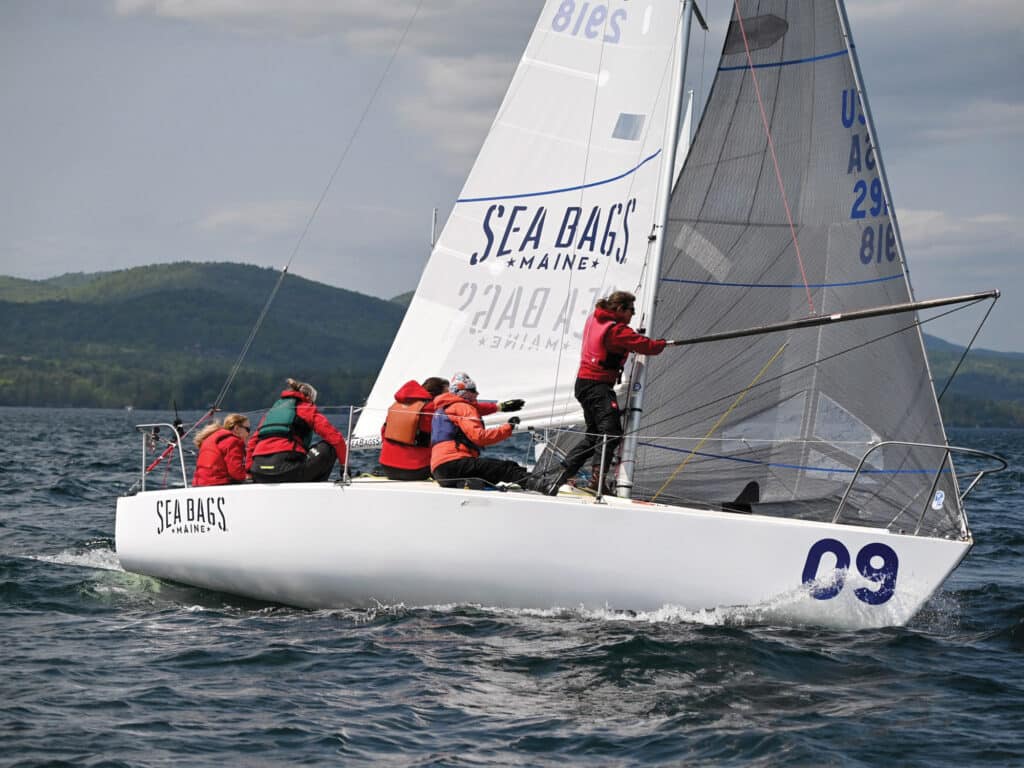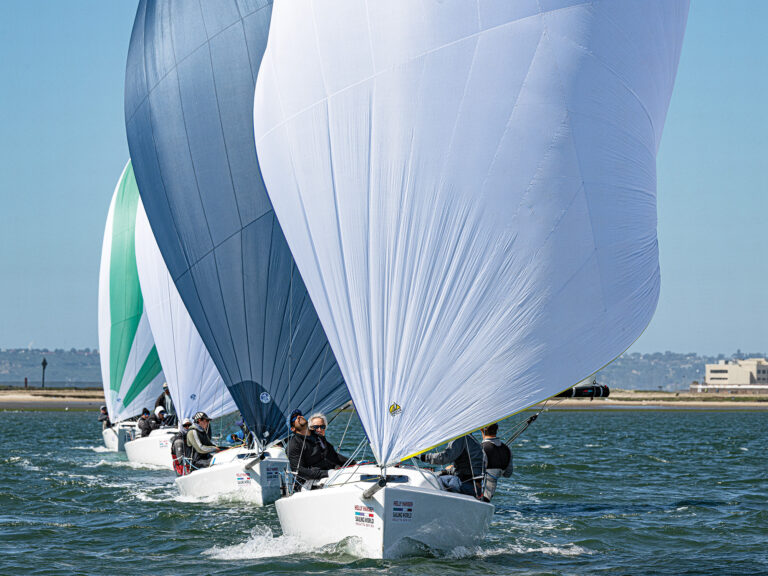
On the first day of the 2023 J/24 National Championship on Lake George, New York, whitecaps cover the racecourse frothed by gusting winds tumbling down steep green mountainsides. My mates and I are sailing upwind before the start of the morning’s first race, and the mainsail flogs with each angry gust, the boat heeling and sliding sideways despite our crew being right at maximum weight. We’re at the blurry crossover between using the genoa or the jib, and obviously we’re struggling with the big sail.
After we turn downwind and return to the starting area, we agree that we’re big boys and we’ve been sailing the boat for the better part of three decades, so we should be able to handle the genoa. Yet as we reach back and forth across the starting line, waiting for signals and looking up the course for any sign of the wind abating, we take stock of the rest of the fleet. Who here is confident or skilled enough to go with the genoa? Who already has the blade on deck?
The fleet appears split 50-50, so that doesn’t help sway us either way.
We soon rationalize that this is our first regatta of the season, we have not sailed together in nine months, and the genoa is brand-new and not worth destroying on the first day—all valid reasons to hank on the blade. After I hastily flake the genoa, shove it below, and shuffle forward with our cute little jib, I note aloud to the rest of the team: “For what it’s worth, the ladies on Sea Bags are going with the genoa—are you sure you want this?”
“Go with it,” is the call. “We change downwind if it’s the wrong sail.”
Shortly thereafter, after a great front-row start, I’m hiking my cheeks off the starboard rail, torso pressed against the upper lifeline, admiring the view. Not far above us is Sea Bags, the white boat of skipper Erica Spencer and her all-female team from Portland, Maine. They are crushing us, and I confess with absolute shame today that the following words passed through my lips: “#$%@. The girls are caning us. How can they be beating us with a genoa right now?”
Yes, I’m a misogynistic fool for even thinking that—worse for uttering it. And I admit that this moment is not the first time I’ve had such thoughts. The same was true last winter when a new female joined the frostbite fleet and proceeded to school me week after week. For the first few weeks, I’d go home and lament to my wife about how bummed I was that the new girl beat me in a race or two. It bothered me until I simply accepted that her beating me had nothing to do with her gender. She was a better sailor.
That I could think and say such things nags at me every day because I don’t know where, how or when in my life I got the idea that my masculinity predisposes me to be faster and smarter than a woman when it comes to getting around the racecourse—so ludicrous. How is it that we male sailors think we’re more capable of muscling a boat through the waves, handling a bigger sail, or being tactically sharper? Why are we so incredulous and resentful when women do beat us?
I know I’m not alone in this space because I hear about it and I see it on a regular basis, from the ranks of youth sailors to the old men of the sport, some of whom still refuse to race with a woman on the boat for fear of bad luck and the intrusion upon their bromances. Despite greater awareness and efforts to provide more opportunities for women in the sport, the prevailing masculine attitude in our sport is as real as ever. Guilty as charged.
Back to Lake George. Over the course of the regatta, Spencer and the talented Sea Bags Women’s Sailing Team drilled into my psyche that gender should not matter whatsoever in sailing. They were far better than us as a team, each individually skilled, and they trained hard for the regatta. They schooled us in the big breeze and zephyrs that followed. When the sails go up, they’re equals. And when the sails go down, they’re peers, friends and champion sailors who deserve equal respect.
When the sails go up, they’re equals. And when the sails go down, they’re peers, friends and champion sailors who deserve equal respect.
Such respect is essential if we’re going to realize long-term and positive change in our sport. We men have the responsibility and the obligation to ensure that the principles of sportsmanship apply across all genders and orientations. I was reminded of this when accusations of sexual harassment and mistreatment of female sailors and staff at the 2023 Etchells World Championship in Miami exposed what we’ve ignored for far too long. A few unnamed sailors and their inexcusable actions reminded us of a real issue in our dude-dominated sport. The class has since responded with a Code of Conduct that “outlines expected standards of behavior by all participants,” which is all fine and good so long as the code is observed and enforced for real. But as the saying goes, manners begin at home, and for the code to have lasting impact, we must first get to the place where the code is unnecessary.
We males must get over ourselves and heed the wisdom of the Great Dane Paul Elvstrom: To earn the respect of our competitors, we must respect them in return. To that end, dear reader, you will note a not-so-subtle theme in the pages that follow, a theme prompted by the Etchells incident and my own shame in Lake George. I can sit here and tell you that women are achieving incredible milestones in sailing, and the movement to provide better opportunities for them is bearing results. But why don’t I just show you?
From the top of the sport on down, women are excelling, and only by learning about these champions can we truly appreciate their talents and contributions, and respect them for their accomplishments. For example, organizers of The Ocean Race vouch that all of its female crews were fan favorites, more so than the men, with the likes of Team Malizia’s Rosaline Kuiper attracting throngs of autograph-seeking followers at every stopover. The 11th Hour Racing trimmer Justine Mettraux is praised by her teammates as an invaluable asset during the race’s most grueling legs. They call her “Justine the Machine” for good reason. She’s the real deal of ocean racing, but you’ll never hear her say it.
Turn the pages to learn from Daniela Moroz, the six-time Formula Kite world champion and four-time Rolex Yachtswoman of the Year. Moroz is positioned as US Sailing’s best—and likely only—gold medal hopeful. Moroz has been riding the tip of the spear of competitive kiteboarding since she was 15. Despite having no traditional sailboat racing background, she jumped in as strategist for Jimmy Spithill’s US SailGP team last year. I’m pretty sure it was the last time the US team won a race. [Eds note: United States SailGP’s Jimmy Spithill states that Moroz did not serve as a strategist and was not on board the F50 during any of the 2022 season races.]
And how about that Stanford Sailing Open National Championship title? Historic. And even more incredible is Kirsten Neuschäfer’s equally historic win of the Golden Globe Race, leaving behind a trail of broken male competitors. In this solo nonstop race of attrition in vintage yachts with celestial navigation, Neuschäfer’s feat and her subsequent rise to stardom is exactly what sailing needed to capture the attention of the world’s media and put the sport front and center.
The list could go on, but while writing this column, I happened upon an Instagram post from Olympian and offshore racing star Sanni Beucke of Germany. I found it right on point. “Female sailors don’t want to be treated differently because of their gender,” she wrote. “They do the same job on the same boats. And they do it really well. Especially offshore, they can show what they’ve got. Because the long distances are all about willpower, willingness to take risks, the spirit of adventure and a strong mindset.”
I have no doubt the sailors aboard Sea Bags would agree. Respect.









